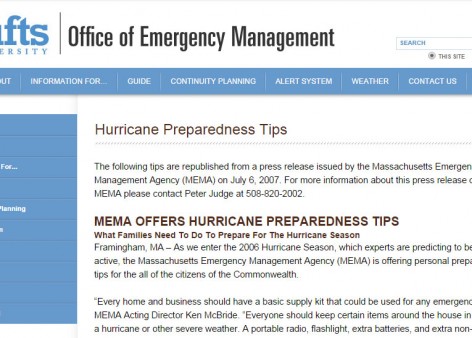 View PDF
View PDF Hurricane
Evacuating the Area of a Hurricane
Electrical Safety during a Hurricane
Preparing for a Hurricane
Hurricane Preparedness Tips

The following tips are republished from a press release issued by the Massachusetts Emergency Management Agency (MEMA) on July 6, 2007. For more information about this press release or about MEMA please contact Peter Judge at 508-820-2002.
What Families Need To Do To Prepare For The Hurricane Season
Framingham, MA – As we enter the 2006 Hurricane Season, which experts are predicting to be very active, the Massachusetts Emergency Management Agency (MEMA) is offering personal preparedness tips for the all of the citizens of the Commonwealth.
“Every home and business should have a basic supply kit that could be used for any emergency,” states MEMA Acting Director Ken McBride. “Everyone should keep certain items around the house in the event of a hurricane or other severe weather. A portable radio, flashlight, extra batteries, and extra non-perishable food and water are all essential to help your family weather the storm.”
Every household should have a supply of canned goods and other non-perishable foods that do not need cooking, along with bottled water, extra prescription medication, and extra food and supplies for infants and pets. A manual can opener and a basic first aid kit are also essential.
“Every family should develop a ‘Family Communication Plan’ to help ensure everyone is safe. You should call your local authorities learn about potential evacuation routes and the location of emergency shelters in your community,” said McBride. “It is important to familiarize yourself with your Community’s Emergency Plans before an emergency situation occurs.”
The Massachusetts Emergency Management Agency (MEMA) is the state agency responsible for coordinating federal, state, local, voluntary and private resources during emergencies and disasters in the Commonwealth of Massachusetts. MEMA provides leadership to: develop plans for effective response to all hazards, disasters or threats; train emergency personnel to protect the public; provide information to the citizenry; and assist individuals, families, businesses and communities to mitigate against, prepare for, and respond to and recover from emergencies, both natural and man made. For additional information about MEMA and Hurricane Preparedness Month, go to www.mass.gov/mema.
Hurricane Disaster Supply Kit
- Canned goods and nonperishable foods that do not need cooking:
- Canned meats and fish
- Canned fruits and vegetables
- Canned soups and puddings
- Canned fruit juices
- Dried fruit and nuts
- Bread, cookies and crackers
- Peanut butter and jelly
- Coffee and tea
- Bottled water
- Manual can opener
- Bottled water (1 gallon per person/per day)
- Prescription medication (2 week supply)
- Pet food/supplies
- Water purification tablets (halazone)
- Disposable plates, cups, and utensils
- Infant care items:
- Disposable diapers
- Baby wipes
- Baby food
- Formula
- First aid supplies
- Masking and duct tape
- Flashlight or lantern, with extra batteries
- Battery operated radio, with extra batteries
- Watch or battery operated clock
- Ice chest
- Matches
- Canned heat (sterno)
- Portable outdoor camping stove or grill with fuel supply
- Plastic trash bags
- Plastic sheeting or drop cloth
- Chlorinated bleach
- Personal hygiene items
- Other useful items:
- Work gloves
- Sun lotion
- Insect repellent
- Hammer
- Screwdriver
- Pliers
- Wrenches
- Handsaw
- Razor knife
- Ax or chainsaw
- Rope caulking
- Nails and screws
- Rope and wire
- Broom, mop and bucket
- All-purpose cleaner
- Ladder
- Sandbags
- Portable generator
- Tree pruner
- Shovel, rake and wheelbarrow
- Sheets of plywood
Family Communication Plan
Develop a ‘Family Emergency Communication Plan’ in case family members are separated from one another during an emergency (a real possibility during the day when adults are at work or traveling and children are at school, camp or a friend’s home). You can then develop a have a plan for safely getting back together. This will help assure everyone that all family members are safe.
- Ask an out-of-state relative or friend to serve as the ‘family contact’. After a disaster, it is often easier to call long distance than locally.
- Make sure everyone knows the name, address and telephone number of the contact person.
Source: http://emergency.tufts.edu/weather/hurricane-preparedness-tips/


